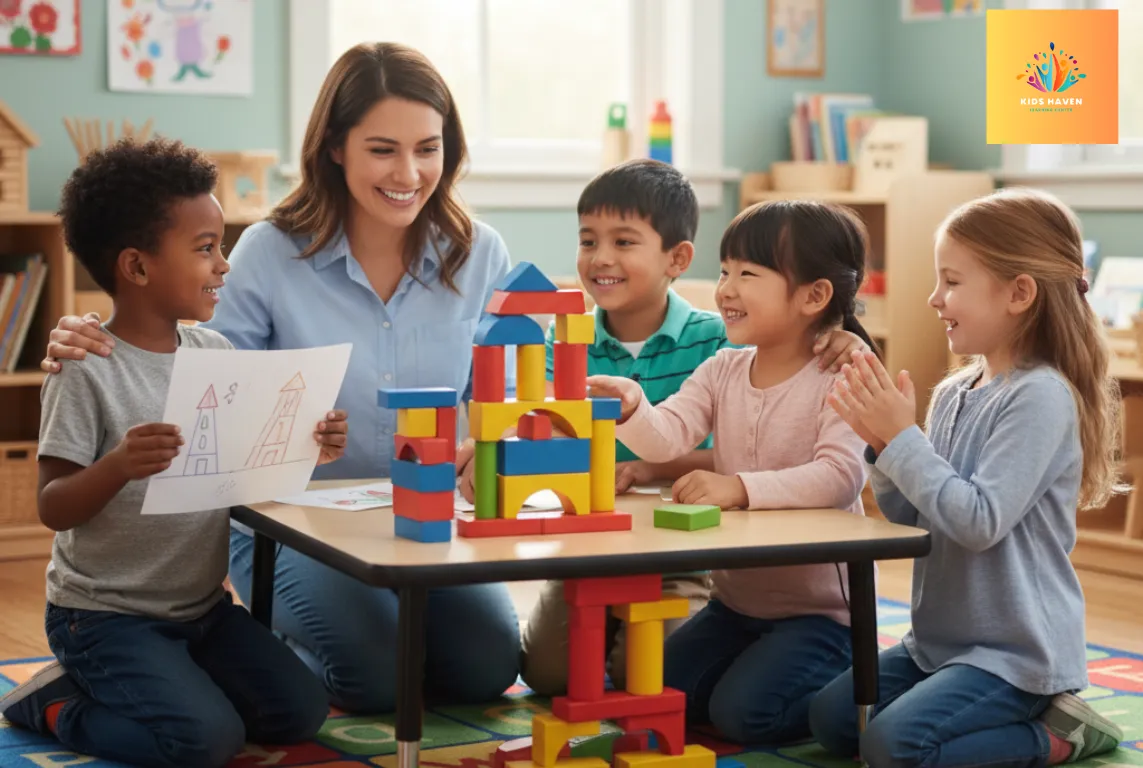
The Social Side of Learning: Building Friendships and Teamwork

The Social Side of Learning: Building Friendships and Teamwork
Children learn best not just from books—but from each other. In every shared laugh, group project, and playground game, they’re building the social and emotional skills that will shape their character for life.
At Kids Haven Learning Center, we know that relationships are the heart of learning. That’s why collaboration, kindness, and communication are woven into everything we do. Whether it’s solving puzzles in pairs, sharing materials in art class, or supporting a friend who feels shy, our classrooms are living lessons in teamwork.
Because education isn’t just about learning facts—it’s about learning how to be part of a community.
Why Social Learning Matters
Humans are social beings. From infancy, children look to others to understand how to act, react, and connect. The classroom provides the perfect environment for this kind of growth.
When children work together, they learn how to listen, share ideas, and resolve differences respectfully. They begin to see that every person contributes something valuable. That understanding builds empathy and respect—two qualities that matter just as much as reading or math.
Research in child development shows that cooperative learning enhances not only social skills but also academic achievement. When children explain ideas to peers or work toward shared goals, they reinforce their own understanding and develop leadership qualities along the way.
At Kids Haven, we design every activity with that social spark in mind.
Teamwork in Action at Kids Haven
In our classrooms, teamwork is not an occasional project—it’s a daily rhythm.
1. Group Learning Activities
Children collaborate on puzzles, building challenges, and problem-solving tasks that require shared effort. They learn how to divide roles, listen to one another, and celebrate collective success.
2. Peer Mentoring Moments
Older or more advanced students often help younger ones with activities, reinforcing empathy and responsibility. This builds confidence for both—the helper feels capable, and the learner feels supported.
3. Play as Practice
Playtime is more than recess; it’s the social laboratory of childhood. During games, children negotiate rules, manage emotions, and practice fairness—all essential parts of growing into respectful, confident individuals.
4. Celebration of Collaboration
We emphasize “we” over “me.” Projects and achievements are celebrated as group successes, teaching that teamwork amplifies what we can achieve alone.
The Emotional Benefits of Friendship
Friendships are the emotional glue of a healthy learning environment. When children feel connected, they are more open to learning and less fearful of making mistakes. A supportive friend can turn frustration into laughter, and a kind word can spark confidence in a nervous student.
At Kids Haven, teachers intentionally create opportunities for connection—pairing children thoughtfully, organizing cooperative play, and modeling kindness in every interaction. The result? A culture where learning feels joyful, safe, and shared.
Friendships also build emotional resilience. When children navigate disagreements or misunderstandings, they learn essential conflict-resolution skills: how to apologize, forgive, and move forward. These are lessons that textbooks can’t teach—but life always will.
How Parents Can Support Social Learning at Home
The lessons of friendship and teamwork don’t stop at school. Parents can reinforce them by:
Encouraging collaboration: Let siblings or friends work together on household projects or creative play.
Modeling empathy: Speak kindly about others, show patience, and discuss feelings openly.
Talking about teamwork: When watching a show or reading a story, point out how characters solve problems together.
Celebrating cooperation: Praise your child not just for achievements, but for kindness, patience, and sharing.
Children learn who they are by watching the people they love most. When they see cooperation and compassion modeled at home, those values take root.
The Lasting Power of Connection
The friendships children build in their early years often become their first lessons in leadership, empathy, and belonging. Through collaboration, they learn that success isn’t a solo journey—it’s a shared one.
At Kids Haven Learning Center, we believe every group project, every team game, and every act of kindness adds up to something greater than academics—it builds character.
When children learn together, they grow together. And in that shared growth, they discover one of life’s greatest truths: learning is richer when it’s shared with friends.